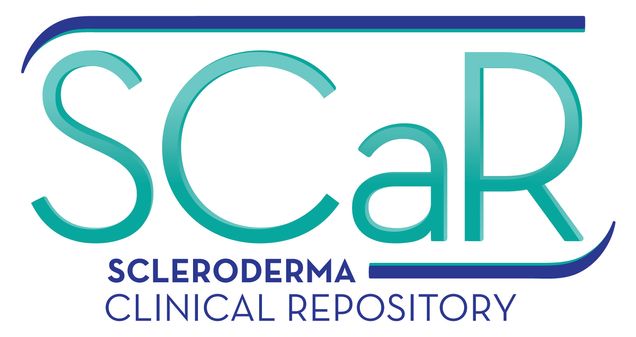Administrative Structure
SCaR is designed to be a long-term international combined clinical database and biosample collection to serve as a resource for participating investigators. It will be adaptable to meet the needs of individual investigators and seek to support studies and associated grant applications by members.
Proposed Administrative Structure: All academic investigators are welcome to join (become members of) SCaR. Only Advisory Members will vote on SCaR projects, database changes, and other administrative issues. SCaR members will “vest” (become Advisory Members) after submission of 5 patients/samples into the database with clinical sample collection. For this interim proposal, that will mean early diffuse patients, as the current driver of SCaR is the Regeneron collaboration. However this may change over time at the discretion of the SCaR Advisory Board (including other patient subsets or different patient numbers).
Continued status as a member will depend on continuing participation as defined by submission of clinicial data and samples on at least an additional 5 patients per year. Membership will be by site/institution, rather than investigator, and there will be only one voting Advisory Member per site.
The Advisory Members will make up the Advisory Board and elect the SCaR Center Director and Associate Director. For this interim administrative structure, Dr. Lafyatis will serve as the Director and choose an Associate Director, most likely the first member to vest. As soon as SCaR has five Advisory Members or “vested investigators”, Advisory Members will elect a new Director and Associate Director. Thereafter, a new Director and Associate Director will be elected every 2 years.
The Director and Associate Director will serve to supervise SCaR operations, making decisions between Advisory Committee meetings and setting the agenda for the monthly committee meetings. They will serve to identify and trouble-shoot issues identified with SCaR operations or access. They will assist in mediating and resolving any issues between SCaR investigators; they will interact with the Advisory Committee to gain advice and consensus about any issues regarding SCaR functions. The Director will chair the Advisory Committee videoconferences, and the Associate Director will do so if the Director is unavailable.
SCaR Advisory Committee members will have full access to the SCaR database. SCaR members will not have direct access to the SCaR database but can submit proposals for projects to access the database.
Confidentiality: All data generated by samples sent from investigators to SCaR will be confidential to that investigator until publication or the investigator releases the data for SCaR use. The Advisory Committee will review violations of this policy.
Patient Confidentiality: All samples and clinical data will be de-identified before submission to SCaR. Any samples or data sent without obliteration of identifiers will be returned immediately to the investigator. Violation of confidentiality will be reported to the local IRB and recurrent violations reported to the Advisory Committee for consideration of restriction of SCaR access.
Authorship: All SCaR investigators will reasonably anticipate co-authorship on all publications arising from SCaR activities to which they have contributed clinical data and/or patient samples.
Changing SCaR Regulations, Operations or Direction: The Advisory Committee can change the above regulations and structures. Any SCaR center member can propose changes in regulations, operations, or direction. The investigator will be responsible for making a formal proposal to the Director, who will submit for discussion at the next Advisory Committee videoconference. An electronic ballot will be sent to all SCaR Advisory Members after the videoconference and changes adopted by a 2/3 positive vote of not less than 75% of SCaR Members responding within a week.
Communication: We will have monthly web conference once SCaR investigators have started actively submitting samples. These will be held in rotation on three different days and times in consecutive months, then repeating, so that in each quarter there will be a meeting on a different day and time. The goal here will be to provide maximum opportunities for investigators to participate in the Advisory conference. Videoconferences will be held via Adobe Connect Pro webinars and presentations. All SCaR Members can join virtual conferences and participate in discussions while sharing visual information and collaborating on documents.

